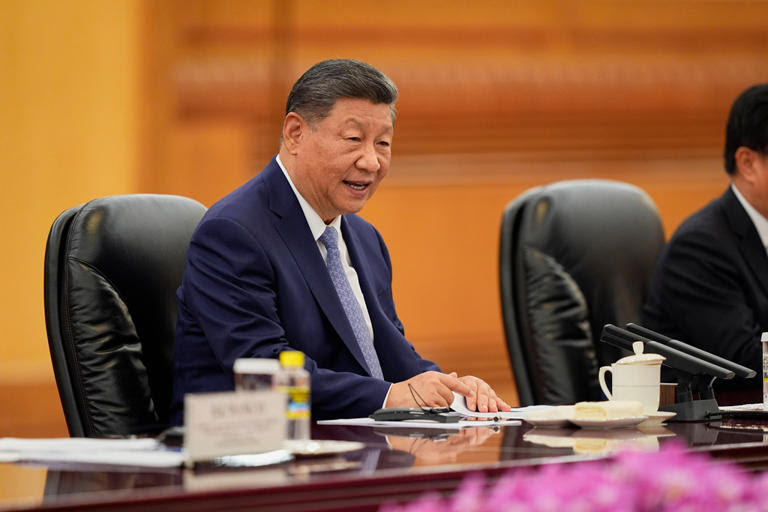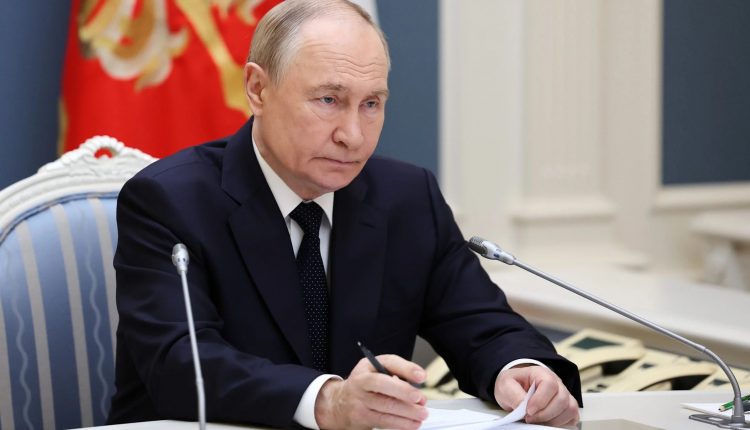By T N Ashok
October 23, 2025
The world just watched Vladimir Putin rehearse Armageddon. On October 22, 2025, the Russian president personally oversaw sweeping nuclear drills—missile launches from land, sea, and air—meant to remind everyone that Moscow still has the power to turn continents to ash. A Yars intercontinental missile roared skyward from Plesetsk, a Sineva missile burst out of the Barents Sea, and Tu-95 bombers let loose their cruise payloads.

It was pure theater—precisely choreographed to say: Russia can strike anywhere, anytime.
But Putin has played this card before. Since invading Ukraine, he’s made nuclear hints as routinely as propaganda speeches—each time trying to freeze Western support. In 2024, just days after Joe Biden let Ukraine hit targets inside Russia, Putin even rewrote his nuclear doctrine to lower the threshold for use. Yet, no red button was pressed. The game was psychological, not apocalyptic.
Now, though, the West may be calling his bluff with something Putin fears far more than NATO tanks—a financial chokehold on Russian oil.
Sanctions Go for the Jugular
The Biden-to-Trump transition didn’t change Washington’s playbook: squeeze the Kremlin’s wallet. The U.S. Treasury has now rolled out the toughest package yet—comprehensive sanctions targeting Russia’s national oil companies. Translation: Washington is finally cutting off the cash that funds Putin’s war and props up his regime.
Oil and gas are the lifeblood of Russia’s state budget and the lubricant of its political system. Previous sanctions were full of loopholes—price caps, exemptions, shadow fleets—but this time, the U.S. is going after the arteries. Worse for Moscow, Washington is twisting arms in New Delhi and Beijing, the two buyers keeping Russia’s economy breathing.
India’s oil imports from Russia ballooned from nearly zero to a major share of its energy mix after Europe banned Russian crude. It was a win-win: cheap oil for India, hard currency for Russia. But now, the White House is quietly warning both India and China—cut back or face secondary sanctions.
For Prime Minister Narendra Modi, that’s a nightmare. Affordable oil keeps inflation down and voters calm. Abandoning Russian barrels risks political backlash and higher fuel costs. Yet ignoring U.S. warnings could strain defense and tech ties that India prizes.
China’s position is trickier. Beijing doesn’t want Russia to collapse—it needs Moscow as a counterweight to U.S. dominance—but it also won’t jeopardize access to Western markets. Expect quiet adjustments: a few cargoes less, more “technical maintenance,” and lots of deniable compliance. If both Asian giants trim purchases even modestly, Russia’s oil revenues could crater within months. That would do what tanks and missiles haven’t—threaten Putin’s power base at home.
Bluff or Brink?
So what happens when an autocrat who’s cornered economically still holds the biggest arsenal on Earth?
Western analysts are split. One camp says Putin’s nuclear bluster is just that—bluster. He’s ruthless, not suicidal. The Russian general staff knows a nuclear strike, even tactical, would invite annihilation and isolate Moscow completely. China and India would bolt, NATO would mobilize, and the regime would crumble under its own fallout.
The other camp sees something darker. Economic strangulation, they argue, makes rational men irrational. If Putin believes the West is out to end him personally, he might gamble on a limited “demonstration” blast—a remote detonation meant to shock the world into backing off. A single mushroom cloud could shatter Western unity and force a ceasefire on Russian terms.
History offers no guide. During the Cold War, nuclear powers faced off but never under total economic siege. Today’s Russia is sanctioned, isolated, and bleeding cash. Desperation can warp decision-making—and the line between bluff and madness can vanish overnight.
The India-China Balancing Act
For Washington, the success of this sanctions offensive hinges on two words: energy diplomacy.
India insists it buys Russian oil to protect its citizens, not to bankroll Putin. But as U.S. envoys fan out to New Delhi and Beijing, the squeeze is on. Expect carefully crafted hedging—fewer visible shipments, more crude moving through intermediaries, and plenty of plausible deniability.
Beijing, meanwhile, is watching for signs of Russian instability. If Moscow wobbles too much, Xi Jinping could quietly distance himself, buying time to protect China’s economy. But if Putin holds firm, China might double down, betting on a weakened but useful ally. Either way, both nations will act in self-interest, not sympathy.
Testing the Edge
For the West, the dilemma is brutal. Ease up, and you confirm that nuclear threats work. Push too hard, and you might find out they don’t. Deputy Foreign Minister Sergei Ryabkov is already warning of a “total vacuum” in arms-control talks, hinting that Moscow might ditch the last vestiges of the New START treaty.
Trump, now back in the White House, has canceled a planned meeting with Putin, calling it “a waste of time.” That leaves zero communication at the top—never a good sign when missiles are flying on screen for show.
The likeliest path forward is more shadowboxing: Russia keeps rattling its nuclear saber; the U.S. keeps ratcheting up sanctions. India and China will trim but not dump Russian oil. Everyone inches closer to the edge—hoping the other side blinks first.
But every round of this deadly poker game raises the risk that someone misreads a move. The nuclear bluff has been called before—but one day, the card on the table may not be a bluff at all


